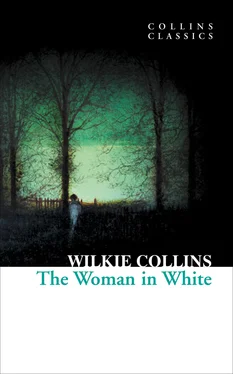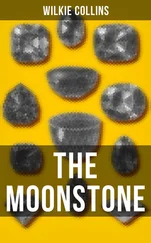Let us take the land first.
In the time of Miss Fairlie’s paternal grandfather (whom we will call Mr. Fairlie, the elder) the entailed succession to the Limmeridge estate stood thus—
Mr. Fairlie, the elder, died and left three sons, Philip, Frederick, and Arthur. As eldest son, Philip succeeded to the estate, If he died without leaving a son, the property went to the second brother, Frederick; and if Frederick died also without leaving a son, the property went to the third brother, Arthur.
As events turned out, Mr. Philip Fairlie died leaving an only daughter, the Laura of this story, and the estate, in consequence, went, in course of law, to the second brother, Frederick, a single man. The third brother, Arthur, had died many years before the decease of Philip, leaving a son and a daughter. The son, at the age of eighteen, was drowned at Oxford. His death left Laura, the daughter of Mr. Philip Fairlie, presumptive heiress to the estate, with every chance of succeeding to it, in the ordinary course of nature, on her uncle Frederick’s death, if the said Frederick died without leaving male issue.
Except in the event, then, of Mr. Frederick Fairlie’s marrying and leaving an heir (the two very last things in the world that he was likely to do), his niece, Laura, would have the property on his death, possessing, it must be remembered, nothing more than a life-interest in it. If she died single, or died childless, the estate would revert to her cousin, Magdalen, the daughter of Mr. Arthur Fairlie. If she married, with a proper settlement—or, in other words, with the settlement I meant to make for her—the income from the estate (a good three thousand a year) would, during her lifetime, be at her own disposal. If she died before her husband, he would naturally expect to be left in the enjoyment of the income, for his lifetime. If she had a son, that son would be the heir, to the exclusion of her cousin Magdalen. Thus, Sir Percival’s prospects in marrying Miss Fairlie (so far as his wife’s expectations from real property were concerned) promised him these two advantages, on Mr. Frederick Fairlie’s death: First, the use of three thousand a year (by his wife’s permission, while she lived, and in his own right, on her death, if he survived her); and, secondly, the inheritance of Limmeridge for his son, if he had one.
So much for the landed property, and for the disposal of the income from it, on the occasion of Miss Fairlie’s marriage. Thus far, no difficulty or difference of opinion on the lady’s settlement was at all likely to arise between Sir Percival’s lawyer and myself.
The personal estate, or, in other words, the money to which Miss Fairlie would become entitled on reaching the age of twenty-one years, is the next point to consider.
This part of her inheritance was, in itself, a comfortable little fortune. It was derived under her father’s will, and it amounted to the sum of twenty thousand pounds. Besides this, she had a life-interest in ten thousand pounds more, which latter amount was to go, on her decease, to her aunt Eleanor, her father’s only sister. It will greatly assist in setting the family affairs before the reader in the clearest possible light, if I stop here for a moment, to explain why the aunt had been kept waiting for her legacy until the death of the niece.
Mr. Philip Fairlie had lived on excellent terms with his sister Eleanor, as long as she remained a single woman. But when her marriage took place, somewhat late in life, and when that marriage united her to an Italian gentleman named Fosco, or, rather, to an Italian nobleman—seeing that he rejoiced in the title of Count—Mr. Fairlie disapproved of her conduct so strongly that he ceased to hold any communication with her, and even went the length of striking her name out of his will. The other members of the family all thought this serious manifestation of resentment at his sister’s marriage more or less unreasonable. Count Fosco, though not a rich man, was not a penniless adventurer either. He had a small but sufficient income of his own. He had lived many years in England, and he held an excellent position in society. These recommendations, however, availed nothing with Mr. Fairlie. In many of his opinions he was an Englishman of the old school, and he hated a foreigner simply and solely because he was a foreigner. The utmost that he could be prevailed on to do, in after years—mainly at Miss Fairlie’s intercession—was to restore his sister’s name to its former place in his will, but to keep her waiting for her legacy by giving the income of the money to his daughter for life, and the money itself, if her aunt died before her, to her cousin Magdalen. Considering the relative ages of the two ladies, the aunt’s chance, in the ordinary course of nature, of receiving the ten thousand pounds, was thus rendered doubtful in the extreme; and Madame Fosco resented her brother’s treatment of her as unjustly as usual in such cases, by refusing to see her niece, and declining to believe that Miss Fairlie’s intercession had ever been exerted to restore her name to Mr. Fairlie’s will.
Such was the history of the ten thousand pounds. Here again no difficulty could arise with Sir Percival’s legal adviser. The income would be at the wife’s disposal, and the principal would go to her aunt or her cousin on her death.
All preliminary explanations being now cleared out of the way, I come at last to the real knot of the case—to the twenty thousand pounds.
This sum was absolutely Miss Fairlie’s own on her completing her twenty-first year, and the whole future disposition of it depended, in the first instance, on the conditions I could obtain for her in her marriage-settlement. The other clauses contained in that document were of a formal kind, and need not be recited here. But the clause relating to the money is too important to be passed over. A few lines will be sufficient to give the necessary abstract of it.
My stipulation in regard to the twenty thousand pounds was simply this: The whole amount was to be settled so as to give the income to the lady for her life—afterwards to Sir Percival for his life—and the principal to the children of the marriage. In default of issue, the principal was to be disposed of as the lady might by her will direct, for which purpose I reserved to her the right of making a will. The effect of these conditions may be thus summed up. If Lady Glyde died without leaving children, her half-sister Miss Halcombe, and any other relatives or friends whom she might be anxious to benefit, would, on her husband’s death, divide among them such shares of her money as she desired them to have. If, on the other hand, she died leaving children, then their interest, naturally and necessarily, superseded all other interests whatsoever. This was the clause—and no one who reads it can fail, I think, to agree with me that it meted out equal justice to all parties.
We shall see how my proposals were met on the husband’s side.
At the time when Miss Halcombe’s letter reached me I was even more busily occupied than usual. But I contrived to make leisure for the settlement. I had drawn it, and had sent it for approval to Sir Percival’s solicitor, in less than a week from the time when Miss Halcombe had informed me of the proposed marriage.
After a lapse of two days the document was returned to me, with notes and remarks of the baronet’s lawyer. His objections, in general, proved to be of the most trifling and technical kind, until he came to the clause relating to the twenty thousand pounds. Against this there were double lines drawn in red ink, and the following note was appended to them—
“Not admissible. The principal to go to Sir Percival Glyde, in the event of his surviving Lady Glyde, and there being no issue.”
Читать дальше











